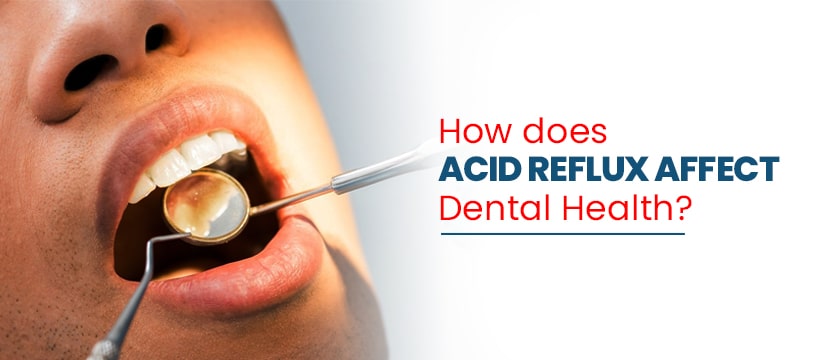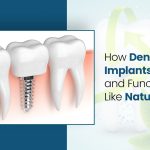You may not know this, but your dental health can be a tell-tale sign of other underlying health problems. In particular, gastroesophageal reflux disease (GERD) has been linked to dental erosion and other oral health problems. In this post, we will explore how acid reflux affects dental health and the measures you can undertake to prevent or mitigate its effects.
What is Acid Reflux?
Acid reflux happens when stomach acid rises up into the oesophagus. This can cause a feeling of burning sensation in the chest or throat. Acid reflux can also lead to tooth erosion and other dental problems.
Acid reflux is a common problem that affects many people. There are a few mitigation measures you can take to help prevent it, such as avoiding foods that trigger acid reflux, eating smaller meals, and not lying down right after eating. If you frequently have acid reflux, you should see your doctor to find out if there is a more serious underlying problem.
The Link between Acid Reflux and Dental Health
There are a few ways that acid reflux can damage the teeth and gums. First, the acid can erode the enamel on the teeth. This can lead to tooth decay and sensitivity. Second, the acid can irritate your gums, causing them to become inflamed and bleed easily. Finally, the acid can cause changes in the bacteria present in the mouth, which can cause gum disease.
Symptoms of Acid Reflux
Acid reflux is a common condition that affects about 20% of the adult population in Australia. The symptoms of acid reflux are often misunderstood as something that only affects the gastrointestinal system, when in reality, it can have far-reaching effects, including on dental health.
The most common symptoms of acid reflux include:
- Heartburn, which is a burning sensation up in the chest.
- Regurgitation
- Difficulty swallowing
- Chronic cough
- Tooth decay
- Inflammation of the gums (gingivitis) or even periodontitis.
- Sour taste in the mouth
If you might be suffering from acid reflux, it’s important to see your doctor to perform an accurate diagnosis. Once diagnosed, there are a number of treatment options available that can help relieve your symptoms and protect your teeth and gums from further damage.
How does Acid Reflux Affect Dental Health?
Acid reflux can have a negative effect on dental health. When stomach acid rises into the throat, it can cause some damage to the teeth and gums. The acid can also irritate the lining of the mouth as well as the throat, which can lead to problems with swallowing. Additionally, acid reflux can contribute to bad breath.
In severe cases, acid reflux can even lead to oesophagal cancer. This is why it’s so important to see a dentist or doctor if you think you may have acid reflux.
Home Remedies for Acid Reflux
Here are several home remedies that can help in relieving acid reflux symptoms. These include:
- Eating smaller meals but more often throughout the day than three large meals.
- Avoid trigger foods that worsen your symptoms, such as fatty or fried foods, spicy foods, citrus fruits, chocolate, and caffeine.
- Elevating your bed’s head by 6 to 8 inches (15 to 20 cm) so that gravity can help keep the stomach contents down.
- Wearing loose-fitting clothing so that pressure is not added to your abdomen.
- Avoiding lying down for three hours after eating.
- Chewing gum or sucking on hard candy increases saliva production and helps neutralize stomach acids.
How to Protect your Teeth and keep your Mouth Clean with GERD
If you have GERD, it is paramount to take steps to protect your dental health. Acid reflux can damage the teeth and gums. Here are some on how to keep your mouth clean and healthy with GERD:-
– Brush your teeth after every meal and before going to bed. Use toothpaste that contains fluoride.
– Floss daily. This will help in removing any plaque or food particles that may be trapped in your teeth.
– Use an antibacterial mouthwash daily.
– Avoid sugary and acidic foods and drinks.
-Chew sugarless gum or suck on sugarless hard candy to increase saliva production and neutralize the acid.
– Avoid smoking. It increases the risk of acid reflux and can also damage your teeth and gums.
Also, see your dentist on a regular basis for checkups as well as cleanings. Make sure that your dentist knows you have any history of acid reflux so they can be on the lookout for signs of damage.
How is Acid Reflux Diagnosed
There are a few ways that acid reflux can be diagnosed.
- Physical examination.
Your doctor will look for signs of damage to the oesophagus or to the lining of the stomach. They may also use equipment such as a stethoscope to listen if there are any abnormal sounds in your stomach or intestines.
- Diagnosis through Upper GI Series
The second way to diagnose acid reflux is through a test called an upper GI series. This test uses x-rays to take pictures of your digestive system. The pictures can help your doctor see if there is any damage to your oesophagus or stomach lining.
- Diagnosis through Endoscopy
The third way to diagnose acid reflux is through a test called endoscopy. This test uses a small camera to look inside your oesophagus and stomach. The camera can help your doctor see if there is any damage to your oesophagus or stomach lining.
Conclusion
Acid reflux can have a significant impact on dental health. The acids in the stomach can wear away at the enamel on teeth, and this can lead to a heightened risk of tooth decay and cavities. Additionally, acid reflux can cause gums inflammation and lead to gum disease. It is paramount to see a dentist regularly to ensure that any potential problems are caught early and treated effectively. If you suspect that you might be suffering from acid reflux and it is affecting your dental health, do not hesitate to schedule an appointment with us at Carrum Downs Dental Group.
Related Post:-
Tooth Enamel Erosion-Causes, Prevention and Treatment
Debunking The 5 Most Common Dental Care Myths
Top 10 Dental Problems and Their Treatments
5 Best Practices to Improve Your Dental Health


